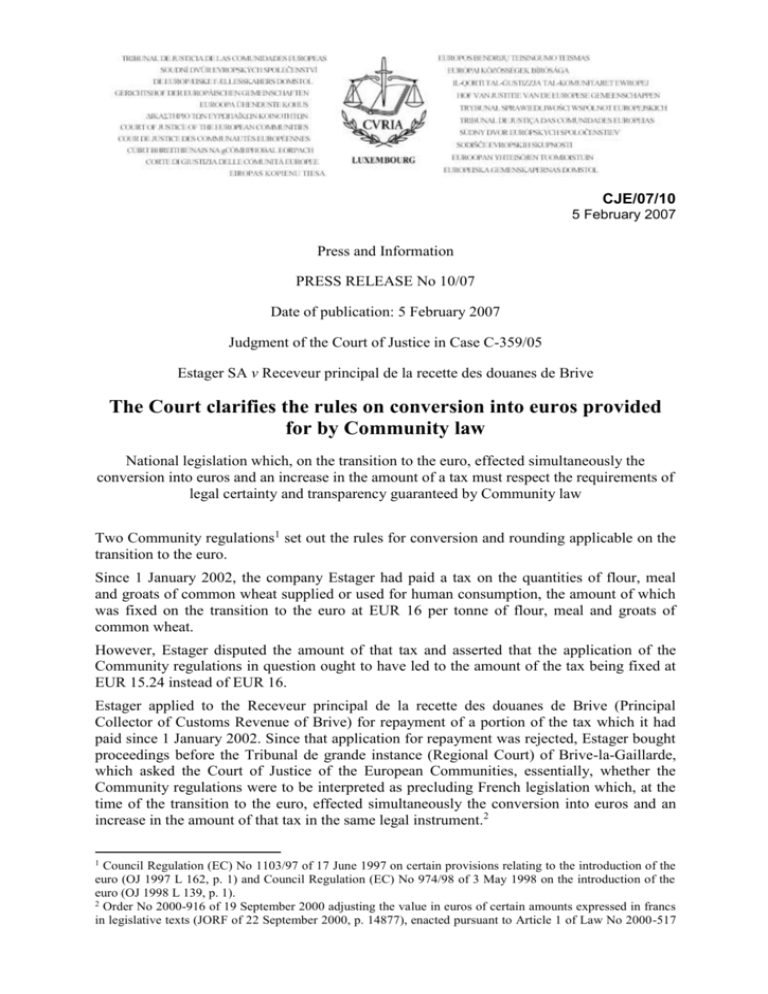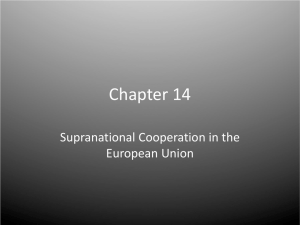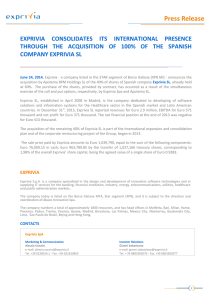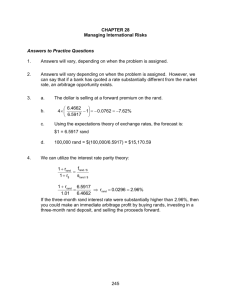DOC - Europa
advertisement

CJE/07/10 5 February 2007 Press and Information PRESS RELEASE No 10/07 Date of publication: 5 February 2007 Judgment of the Court of Justice in Case C-359/05 Estager SA v Receveur principal de la recette des douanes de Brive The Court clarifies the rules on conversion into euros provided for by Community law National legislation which, on the transition to the euro, effected simultaneously the conversion into euros and an increase in the amount of a tax must respect the requirements of legal certainty and transparency guaranteed by Community law Two Community regulations1 set out the rules for conversion and rounding applicable on the transition to the euro. Since 1 January 2002, the company Estager had paid a tax on the quantities of flour, meal and groats of common wheat supplied or used for human consumption, the amount of which was fixed on the transition to the euro at EUR 16 per tonne of flour, meal and groats of common wheat. However, Estager disputed the amount of that tax and asserted that the application of the Community regulations in question ought to have led to the amount of the tax being fixed at EUR 15.24 instead of EUR 16. Estager applied to the Receveur principal de la recette des douanes de Brive (Principal Collector of Customs Revenue of Brive) for repayment of a portion of the tax which it had paid since 1 January 2002. Since that application for repayment was rejected, Estager bought proceedings before the Tribunal de grande instance (Regional Court) of Brive-la-Gaillarde, which asked the Court of Justice of the European Communities, essentially, whether the Community regulations were to be interpreted as precluding French legislation which, at the time of the transition to the euro, effected simultaneously the conversion into euros and an increase in the amount of that tax in the same legal instrument.2 1 Council Regulation (EC) No 1103/97 of 17 June 1997 on certain provisions relating to the introduction of the euro (OJ 1997 L 162, p. 1) and Council Regulation (EC) No 974/98 of 3 May 1998 on the introduction of the euro (OJ 1998 L 139, p. 1). 2 Order No 2000-916 of 19 September 2000 adjusting the value in euros of certain amounts expressed in francs in legislative texts (JORF of 22 September 2000, p. 14877), enacted pursuant to Article 1 of Law No 2000-517 In a judgment delivered on 18 January 2007, the Court replied to that question in the following way: At the outset, the Court noted the respective purposes of the regulations, which provide that, by virtue of a generally accepted principle of law, the continuity of contracts is not affected by the introduction of a new currency and that the objective of the provisions relating to that continuity is to provide legal certainty and transparency for economic agents, in particular consumers. Moreover, the substitution of the euro for the currency of each participating Member State is not in itself to have the effect of altering the denomination of legal instruments in existence on the date of substitution. The setting of rules relating to conversion operations also shares the objective that the transition to the euro should be neutral. The attempt to ensure that those operations are as neutral as possible, for both citizens and firms, presupposes that a high degree of accuracy in conversion operations is guaranteed. The Court notes that there cannot be any doubt, first, that the French tax constitutes a ‘term of a legal instrument’ within the meaning of the Community regulations on the introduction of the euro and, secondly, that, in adopting the legislation at issue, the French legislature intended to apply those same regulations in order to fix the amount of the tax. Whilst those regulations in no way undermined the fiscal competence of Member States and their ability to increase the amount of their taxes, it is no less true that the conversion into euros of the amount of a tax must, in such circumstances, be effected in a manner which respects the Community provisions, the principle of continuity of legal instruments and the objective of neutrality in the transition to the euro. It follows that, when it proceeds to a simultaneous conversion into euros and an increase in the amount of a tax, as in the situation in the present case, a Member State must ensure that legal certainty and transparency for economic agents are guaranteed. Respect for those requirements requires, in particular, that those agents are able to distinguish clearly in the legislative texts at issue the result of the conversion of an amount of tax into euros from the decision of the authorities of a Member State to increase that amount. Unofficial document for media use, not binding on the Court of Justice. Languages available: DE, EL, EN, ES, FR, IT, NL, SL, PT, FI The full text of the judgment may be found on the Court’s internet site http://curia.europa.eu/jurisp/cgi-bin/form.pl?lang=EN&Submit=rechercher&numaff=C-359/05 It can usually be consulted after midday (CET) on the day judgment is delivered. For further information, please contact Christopher Fretwell Tel: (00352) 4303 3355 Fax: (00352) 4303 2731 of 15 June 2000 enabling the Government to adjust by order the value in euros of certain amounts expressed in francs in legislative texts (JORF of 16 June 2000, p. 9063)











